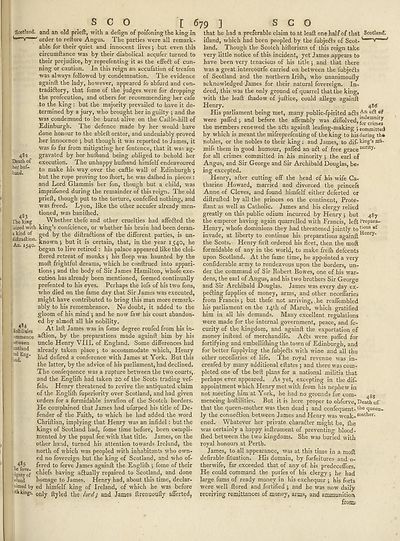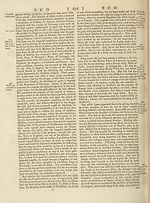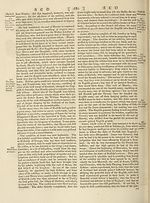Encyclopaedia Britannica, or, a Dictionary of arts, sciences, and miscellaneous literature : enlarged and improved. Illustrated with nearly six hundred engravings > Volume 18, RHI-SCR
(717) Page 679
Download files
Complete book:
Individual page:
Thumbnail gallery: Grid view | List view

SCO
482
Death of
her huf-
band.
483
The king
Scotland, and an old prleft, with a defign of poifoningthe king in
"'‘’’"v ' order to reftore Angus. The parties were all remark¬
able for their quiet and innocent lives $ but even this
circumftance was by their diabolical accufer turned to
their prejudice, by reprefenting it as the eflfeft of cun¬
ning or caution. In this reign an accufation of treafon
•was always followed by condemnation. The evidence
againft the lady, however, appeared fo abfurd and con-
tradiftory, that fome of the judges were for dropping
the profecution, and others for recommending her cafe
to the king: but the majority prevailed to have it de¬
termined by a jury, who brought her in guilty ; and Ihe
was condemned to be burnt alive on the Caftle-hill of
Edinburgh. The defence made by her would have
done honour to the ableft orator, and undeniably proved
her innocence j but though it was reported to James, it
was fo far from mitigating her fentence, that it was ag¬
gravated by her hufband being obliged to behold her
execution. The unhappy hufband himfelf endeavoured
to make his way over the caftle wall of Edinburgh *,
but the rope proving too fhort, he was daftied in pieces :
and Lord Glammis her fon, though but a child, was
imprifoned during the remainder of this reign. The old
prieft, though put to the torture, confeffed nothing, and
was freed. Lyon, like the other accufer already men¬
tioned, was baniflied.
Whether thefe and other cruelties had affe&ed the
"eized with king’s confcience, or whether his brain had been deran-
of ge(J by the diftradlions of the different parties, is un-
known j but it is certain, that, in the year 1540, he
began to live retired : his palace appeared like the cloi-
ftered retreat of monks 5 his deep was haunted by the
moft frightful dreams, which he conftrued into appari¬
tions $ and the body of Sir James Hamilton, whofe exe¬
cution has already been mentioned, feemed continually
prefented to his eyes. Perhaps the lofs of his two fons,
who died on the fame day that Sir James was executed,
might have contributed to bring this man more remark¬
ably to his remembrance. No doubt, it added to the
gloom of his mind ; and he now faw his court abandon¬
ed by alnaoft all his nobility.
At laft James was in fome degree roufed from his in¬
action, by the preparations made againft him by his
uncle Henry VIII. of England. Some differences had
already taken place ; to accommodate which, Henry
had deftred a conference with James at York. But this
the latter, by the advice of his parliament, had declined.
The confequence was a rupture between the two courts,
and the Englifh had taken 20 of the Scots trading vef-
fels. Henry threatened to revive the antiquated claim
of the Englifh fuperiority over Scotland, and had given
orders for a formidable invafion of the Scotch borders.
He complained that James had ufurped his title of De¬
fender of the Faith, to which he had added the word
Chriftian, implying that Henry was an infidel : but the
kings of Scotland had, fome time before, been compli¬
mented by the papal fee with that title. James, on the
other hand, turned his attention towards Ireland, the
north of which was peopled with inhabitants who own¬
ed no fovereign but the king of Scotland, and who of¬
fered to ferve James againft the Englifh ; fome of their
chiefs having aftually repaired to Scotland, and done
homage to James. Henry had, about this time, declar-
«imed by ed himfelf king of Ireland, of which he was before
hikings. oniy ftyled the /ord; and James ftrenuoufly afferted,
[ 679 ]
SCO
4*4
toftiliiies
ommence
etween
cotland
nd Eng-
ind.
t 4*5
ne fove.
!>gnty of
stand
that he had a preferable claim to at leaft one half of that ScotlantJ,
ifland, which had been peopled by the fubjefts of Scot- ' ' * -
land. Though the Scotch hiftorians of this reign take
very little notice of this incident, yet James appears to
have been very tenacious of his title; and that there
was a great intercourfe carried on between the fubje&s
of Scotland and the northern Irifh, who unanimoufly
acknowledged James for their natural fovereign. In¬
deed, this was the only ground of quarrel that the king,
with the leaft fbadow of juftice, could allege againft
Henry. 48tf
His parliament being met, many public-fpirited afls An
were paffed 5 and before the affembly was difiblved, fyf crimes
the members renewed the ails againft leafing-making 5 committed
by which is meant the mifreprefenting of the king to his during th*
nobles, or the nobles to their king: and James, to dif-king’s nri~
mifs them in good humour, paffed an aft of free grace nont^
for all crimes committed in his minority ; the earl of
Angus, and Sir George and Sir Archibald Douglas, be¬
ing excepted.
Henry, after cutting off the head of his wife Ca¬
tharine Howard, married and divorced the princefs
Anne of Cleves, and found himfelf either deferted or
diftrufted by all the princes on the continent, Prote-
ftant as well as Catholic. James and his clergy relied
greatly on this public odium incurred by Henry ; but 4S7
the emperor having again quarrelled with Francis, left Prcpara-
Henry, whofe dominions they had threatened jointly totlons
invade, at liberty to continue his preparations againft Henry*
the Scots. Henry firft ordered his fleet, then the moft
formidable of any in the world, to make frefti delcents
upon Scotland. At the fame time, he appointed a very
confiderable army to rendezvous upon the borders, un¬
der the command of Sir Robert Bowes, one of his war¬
dens, the earl of Angus, and his two brothers Sir George
and Sir Archibald Douglas. James was every day ex-
pefting fupplies of money, arms, and other neceffaries
from Francis ; but thefe not arriving, he reaffembled
his parliament on the 14th of March, which gratified
him in all his demands. Many excellent regulations
were made for the internal government, peace, and fe-
curity of the kingdom, and againft the exportation of
money inftead of merchandife. Afts were pafled for
fortifying and embellifhing the town of Edinburgh, and
for better fupplying the fubjefts with wine and all the
other neceflaries of life. The royal revenue was in-
creafed by many additional eftates ; and there was com¬
pleted one of the beft plans for a national militia that
perhaps ever appeared. As yet, excepting in the dif-
appointment which Henry met with from his nephew in
not meeting him at York, he had no grounds for com¬
mencing hoftilities. But it is here proper to obferve, Dealhof:
that the queen-mother was then dead ; and ccnfequent-the queen¬
ly the conneftion between James and Henry was weak-niotlier‘
ened. Whatever her private charafter might be, ftie
was certainly a happy inftrument of preventing blood-
fhed between the two kingdoms. She was burled with
royal honours at Perth.
James, to all appearance, was at this time in a moft
defirable fituation. His domain, by forfeitures and o-
therwife, far exceeded that of any of his predeceffors.
He could command the purfes of his clergy j he had
large fums of ready money in his exchequer ; his forts
were well ftored and fortified ; and he was now daily
receiving remittances of money, arms, and ammunition
from-
4S8
482
Death of
her huf-
band.
483
The king
Scotland, and an old prleft, with a defign of poifoningthe king in
"'‘’’"v ' order to reftore Angus. The parties were all remark¬
able for their quiet and innocent lives $ but even this
circumftance was by their diabolical accufer turned to
their prejudice, by reprefenting it as the eflfeft of cun¬
ning or caution. In this reign an accufation of treafon
•was always followed by condemnation. The evidence
againft the lady, however, appeared fo abfurd and con-
tradiftory, that fome of the judges were for dropping
the profecution, and others for recommending her cafe
to the king: but the majority prevailed to have it de¬
termined by a jury, who brought her in guilty ; and Ihe
was condemned to be burnt alive on the Caftle-hill of
Edinburgh. The defence made by her would have
done honour to the ableft orator, and undeniably proved
her innocence j but though it was reported to James, it
was fo far from mitigating her fentence, that it was ag¬
gravated by her hufband being obliged to behold her
execution. The unhappy hufband himfelf endeavoured
to make his way over the caftle wall of Edinburgh *,
but the rope proving too fhort, he was daftied in pieces :
and Lord Glammis her fon, though but a child, was
imprifoned during the remainder of this reign. The old
prieft, though put to the torture, confeffed nothing, and
was freed. Lyon, like the other accufer already men¬
tioned, was baniflied.
Whether thefe and other cruelties had affe&ed the
"eized with king’s confcience, or whether his brain had been deran-
of ge(J by the diftradlions of the different parties, is un-
known j but it is certain, that, in the year 1540, he
began to live retired : his palace appeared like the cloi-
ftered retreat of monks 5 his deep was haunted by the
moft frightful dreams, which he conftrued into appari¬
tions $ and the body of Sir James Hamilton, whofe exe¬
cution has already been mentioned, feemed continually
prefented to his eyes. Perhaps the lofs of his two fons,
who died on the fame day that Sir James was executed,
might have contributed to bring this man more remark¬
ably to his remembrance. No doubt, it added to the
gloom of his mind ; and he now faw his court abandon¬
ed by alnaoft all his nobility.
At laft James was in fome degree roufed from his in¬
action, by the preparations made againft him by his
uncle Henry VIII. of England. Some differences had
already taken place ; to accommodate which, Henry
had deftred a conference with James at York. But this
the latter, by the advice of his parliament, had declined.
The confequence was a rupture between the two courts,
and the Englifh had taken 20 of the Scots trading vef-
fels. Henry threatened to revive the antiquated claim
of the Englifh fuperiority over Scotland, and had given
orders for a formidable invafion of the Scotch borders.
He complained that James had ufurped his title of De¬
fender of the Faith, to which he had added the word
Chriftian, implying that Henry was an infidel : but the
kings of Scotland had, fome time before, been compli¬
mented by the papal fee with that title. James, on the
other hand, turned his attention towards Ireland, the
north of which was peopled with inhabitants who own¬
ed no fovereign but the king of Scotland, and who of¬
fered to ferve James againft the Englifh ; fome of their
chiefs having aftually repaired to Scotland, and done
homage to James. Henry had, about this time, declar-
«imed by ed himfelf king of Ireland, of which he was before
hikings. oniy ftyled the /ord; and James ftrenuoufly afferted,
[ 679 ]
SCO
4*4
toftiliiies
ommence
etween
cotland
nd Eng-
ind.
t 4*5
ne fove.
!>gnty of
stand
that he had a preferable claim to at leaft one half of that ScotlantJ,
ifland, which had been peopled by the fubjefts of Scot- ' ' * -
land. Though the Scotch hiftorians of this reign take
very little notice of this incident, yet James appears to
have been very tenacious of his title; and that there
was a great intercourfe carried on between the fubje&s
of Scotland and the northern Irifh, who unanimoufly
acknowledged James for their natural fovereign. In¬
deed, this was the only ground of quarrel that the king,
with the leaft fbadow of juftice, could allege againft
Henry. 48tf
His parliament being met, many public-fpirited afls An
were paffed 5 and before the affembly was difiblved, fyf crimes
the members renewed the ails againft leafing-making 5 committed
by which is meant the mifreprefenting of the king to his during th*
nobles, or the nobles to their king: and James, to dif-king’s nri~
mifs them in good humour, paffed an aft of free grace nont^
for all crimes committed in his minority ; the earl of
Angus, and Sir George and Sir Archibald Douglas, be¬
ing excepted.
Henry, after cutting off the head of his wife Ca¬
tharine Howard, married and divorced the princefs
Anne of Cleves, and found himfelf either deferted or
diftrufted by all the princes on the continent, Prote-
ftant as well as Catholic. James and his clergy relied
greatly on this public odium incurred by Henry ; but 4S7
the emperor having again quarrelled with Francis, left Prcpara-
Henry, whofe dominions they had threatened jointly totlons
invade, at liberty to continue his preparations againft Henry*
the Scots. Henry firft ordered his fleet, then the moft
formidable of any in the world, to make frefti delcents
upon Scotland. At the fame time, he appointed a very
confiderable army to rendezvous upon the borders, un¬
der the command of Sir Robert Bowes, one of his war¬
dens, the earl of Angus, and his two brothers Sir George
and Sir Archibald Douglas. James was every day ex-
pefting fupplies of money, arms, and other neceffaries
from Francis ; but thefe not arriving, he reaffembled
his parliament on the 14th of March, which gratified
him in all his demands. Many excellent regulations
were made for the internal government, peace, and fe-
curity of the kingdom, and againft the exportation of
money inftead of merchandife. Afts were pafled for
fortifying and embellifhing the town of Edinburgh, and
for better fupplying the fubjefts with wine and all the
other neceflaries of life. The royal revenue was in-
creafed by many additional eftates ; and there was com¬
pleted one of the beft plans for a national militia that
perhaps ever appeared. As yet, excepting in the dif-
appointment which Henry met with from his nephew in
not meeting him at York, he had no grounds for com¬
mencing hoftilities. But it is here proper to obferve, Dealhof:
that the queen-mother was then dead ; and ccnfequent-the queen¬
ly the conneftion between James and Henry was weak-niotlier‘
ened. Whatever her private charafter might be, ftie
was certainly a happy inftrument of preventing blood-
fhed between the two kingdoms. She was burled with
royal honours at Perth.
James, to all appearance, was at this time in a moft
defirable fituation. His domain, by forfeitures and o-
therwife, far exceeded that of any of his predeceffors.
He could command the purfes of his clergy j he had
large fums of ready money in his exchequer ; his forts
were well ftored and fortified ; and he was now daily
receiving remittances of money, arms, and ammunition
from-
4S8
Set display mode to:
![]() Universal Viewer |
Universal Viewer | ![]() Mirador |
Large image | Transcription
Mirador |
Large image | Transcription
Images and transcriptions on this page, including medium image downloads, may be used under the Creative Commons Attribution 4.0 International Licence unless otherwise stated. ![]()
| Permanent URL | https://digital.nls.uk/193028028 |
|---|
| Attribution and copyright: |
|
|---|
| Description | Ten editions of 'Encyclopaedia Britannica', issued from 1768-1903, in 231 volumes. Originally issued in 100 weekly parts (3 volumes) between 1768 and 1771 by publishers: Colin Macfarquhar and Andrew Bell (Edinburgh); editor: William Smellie: engraver: Andrew Bell. Expanded editions in the 19th century featured more volumes and contributions from leading experts in their fields. Managed and published in Edinburgh up to the 9th edition (25 volumes, from 1875-1889); the 10th edition (1902-1903) re-issued the 9th edition, with 11 supplementary volumes. |
|---|---|
| Additional NLS resources: |
|

